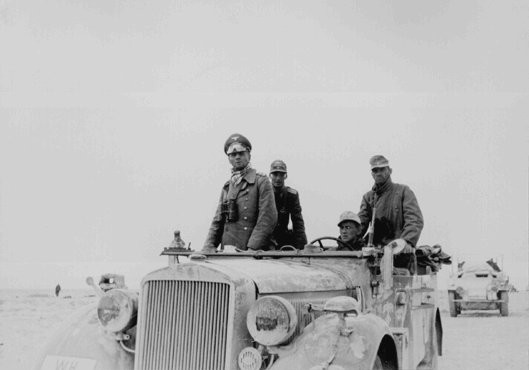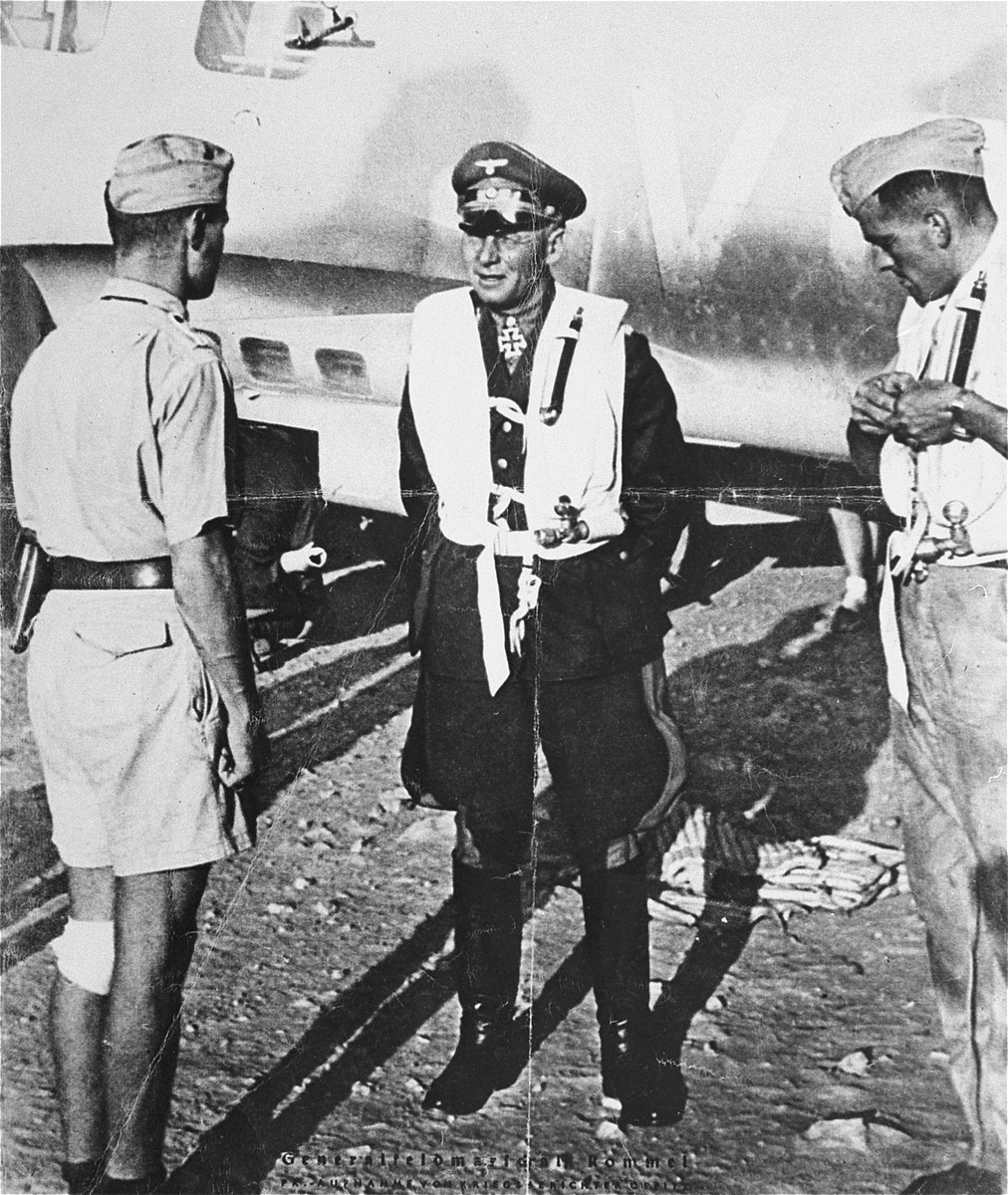
Erwin Rommel
Erwin Rommel was a German army officer who rose to the rank of Field Marshal. He was renowned as an innovator of armored tactics, particularly as commander of the Afrika Korps in North Africa. There is a “myth” or legend which depicts Rommel as a chivalrous and noble military opponent who was not driven by political ideology. In reality, there is ambiguity about the depth of his commitment to Nazi ideology.
Key Facts
-
1
Rommel took command of German forces in North Africa in February 1941. He earned the nickname the “Desert Fox” after achieving stunning early victories there.
-
2
After the Allied victory in North Africa, Rommel returned to Europe and took command of the defenses in Normandy.
-
3
One of the most widely debated questions about Rommel remains that of the depth of his conviction in Nazism.
Rommel during World War I and the Interwar Period
Erwin Rommel was born in Württemberg, Germany, in 1891. He joined the German army in 1910 as an infantry officer and served with distinction in World War I. Rommel fought primarily on the western front, mostly in France and Italy. After striking successes at the Battle of Caporetto and in the capture of Longorone in Italy, Rommel was promoted to the rank of captain in January 1918.
In 1919, Erwin Rommel participated in the suppression of uprisings by revolutionary communists in the German cities of Lindau and Schwäbisch-Gmünd. In doing so, Rommel became renowned for avoiding bloodshed and for relying on negotiation to resolve conflict. From 1929 through 1933, Rommel served as an instructor at the Dresden Infantry School and from 1935 at the German War Academy at Potsdam. Impressed with Rommel’s excellent reputation as an instructor, Adolf Hitler assigned him in 1937 as the War Ministry liaison officer to the Hitler Youth, tasked with their military training. But Rommel clashed with Hitler Youth leader Baldur von Schirach on many issues and was removed the following year.
In October 1938, Hitler requested that Erwin Rommel command Hitler’s personal escort battalion, which accompanied the Führer whenever he traveled outside of Germany.
World War II

In 1939, then Major General Rommel continued to command Hitler’s escort battalion throughout the invasion of Poland. This was an important post, for Hitler took a very personal interest in the campaign, often traveling close to the front during the campaign. In 1940, General Rommel commanded the 7th Panzer Division during the invasion of France where he demonstrated skill in the new tactic of blitzkrieg. At the same time, he demonstrated a tendency toward self-promotion and a lack of logistical expertise. These two characteristics would follow him throughout his career.
In February 1941, Rommel took command of German forces in North Africa. There, he earned the nickname the “Desert Fox.” A wily and aggressive commander, he achieved stunning victories, but he was hobbled by his shortcomings in logistics and by the increasing power of Allied troops. By 1943, the Allies defeated Rommel’s troops in Africa. He returned to Europe to oversee defenses in Normandy, a post he held until his death in 1944.
Erwin Rommel, the Nazis, and the Holocaust
One of the most widely debated questions about Erwin Rommel is the extent to which he supported Nazism, and by extension, the Holocaust. Some have argued he was deeply complicit. Others have suggested that, while he supported the Nazis, he did so grudgingly or out of political naiveté. Addressing this dilemma can be complex. One argument is that many generals may not have been convinced Nazis, but recognized common goals that they willingly supported. Rommel, too, fell into this category.
In Erwin Rommel's case, his relationship with the Nazi Party perhaps began in 1937 when he was appointed liaison officer to the Hitler Youth. Through this position he came into close contact with many important Nazis. Rommel caught the attention of Hitler, who did much to support Rommel’s career. Hitler’s choice of Rommel as commander of Hitler’s bodyguard in 1939 and quick rise in rank demonstrated Hitler’s confidence in him. Rommel too liked Hitler and appreciated the preferential treatment he (Rommel) received, noting that “[Hitler] is extraordinarily friendly to me.”
Yet the extent of Rommel’s antisemitism or racism is more difficult to discover. It appears most likely that he chose to overlook the more extreme elements of Nazi policy. It is true that he flatly refused to carry out several criminal orders issued by his superiors, such as the execution of Black soldiers and Free French fighters. This does not mean, however, that he was ignorant of anti-Jewish policy and the “Final Solution.” Through his access to high-ranking Nazi officials, he would have had access to inside information.
Even more problematic was his relationship to a proposed Einsatzgruppen Egypt. This unit was to be tasked with murdering the sizeable Jewish population of North Africa and the British mandate of Palestine and to be attached directly to Rommel’s Afrika Korps. Its commander, Walther Rauff, had helped design the gas van. Rauff met with Rommel’s staff in 1942 to prepare for the arrival of the units. No evidence exists to record Rommel’s position on the proposed measure, but he was certainly aware that planning was taking place. While the larger Einsatzgruppen were never deployed, smaller detachments did murder Jews in North Africa.
The July 20th Plot to Kill Hitler
One of the founding elements of the “myth” of Rommel as an “honorable” opponent comes from his ambiguous participation in the July 20, 1944, plot to assassinate Hitler. Rommel had recognized that the war was lost and confronted Hitler on the topic. However, it appears that friends and historians alike attempted to portray Rommel’s involvement as greater and more committed than it actually was. Rommel had some connections to the plotters but was not involved in detailed planning. Indeed, it appears Rommel was, at the least, opposed to killing Hitler, even if he supported removing him from power.
Based on the evidence, Rommel was sympathetic but was neither a central player nor willing to take decisive action in support of the conspiracy. When the search for conspirators implicated him, he was given the option of killing himself, as the regime sought to avoid the embarrassment of prosecuting one of its beloved generals in public.
How Did Rommel Die?
Erwin Rommel committed suicide in the aftermath of the failed July 20 plot. Confronted by two generals at his home on October 14, 1944, Rommel chose to commit suicide rather than to face prosecution. The Nazi German regime lied to the public about Rommel’s death. The Nazi press told the German public that Rommel had died as a complication of the injuries he received in France when British bombers strafed his staff car shortly before the failed plot. Field Marshal Erwin Rommel was given a state funeral, and Hitler ordered an official day of mourning to commemorate the general.
Critical Thinking Questions
What pressures and motivations affected Rommel’s choices during World War II, in his military career and in his support for Nazi ideology?
How did the role of the German military change during 1933-1945? Why?
Have military codes and the Laws of Armed Conflict changed since World War II? How and why?

